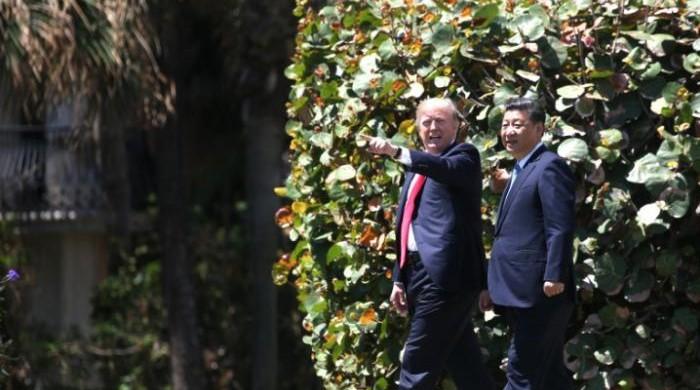China's Xi urges restraint on N. Korea on call with Trump amid escalating worries
April 24, 2017

Chinese President Xi Jinping told US President Donald Trump that he hopes all sides exercise restraint over the issue of North Korea and that China opposes anything that runs counter to UN Security Council resolutions, state media said on Monday.
Xi said during a telephone call with Trump that all sides should avoid doing anything to worsen tensions, state television reported.
Tensions over the Korean peninsula
The world has been witnessing a rapid-fire exchange of comments laced with threats between the two nations. While some of the countries are just spectators, others, including China, Japan, South Korea, and Russia, have a stake if these warnings escalate further.
The Kremlin previously said it favoured diplomatic methods of resolutions of all crises, including on the Korean peninsula, amid mounting tensions between Washington and Pyongyang over North Korea's nuclear program. "We call all countries for restraint, we call all the countries to refrain from any actions that could amount to provocative steps", Kremlin spokesman Dmitry Peskov told a conference call with reporters.
On the other hand, when asked about relations since Trump became president, Russian President Vladimir Putin said, as per a transcript of the interview released by the Kremlin, "One could say that the level of trust on a working level, especially on the military level, has not improved, but rather has deteriorated."
A fresh North Korean missile test failed when it exploded after launch last Sunday, the US military said, a day after Pyongyang defiantly showcased its ballistic arsenal at a giant military parade. It came after North Korea displayed nearly 60 missiles – including what is suspected to be a new intercontinental ballistic missile – at a parade to mark the 105th birthday of its founder Kim Il-Sung.
Earlier, Trump through his Twitter account expressed confidence that China, Pyongyang's sole ally, would "properly deal with North Korea". But, "if they are unable to do so, the US, with its allies, will! USA."
Privately though, the White House acknowledges that striking North Korea would be a "much more complicated piece of business" than the Syria strike, in the words of a second senior administration official.
The ominous comments came the same day Trump ordered the dropping of the biggest non-nuclear bomb the US military possesses on Afghanistan, targeting a complex used by the Daesh group. Before that, he flexed his military muscle by ordering cruise missile strikes on a Syrian airbase the US believed was the origin of an alleged chemical weapons attack on civilians in a northern Syria town.
Nevertheless, Trump later said Xi, during a meeting in Florida, had corrected his prior misconception that Beijing could easily get rid of the North Korea threat.
Beijing, however, has long opposed dramatic action against Pyongyang, fearing the regime's collapse would send a flood of refugees across its borders and leave the US military on its doorstep. But "the US has run out of patience," an analyst said.
A US strike on North Korea could prompt retaliation against allies or US forces in South Korea or Japan. Therefore, South Korea has accordingly put its forces on heightened alert.
North Korea has held that it is ready to sink a US aircraft carrier to demonstrate its military might, as two Japanese navy ships joined a US carrier group for exercises in the western Pacific.
Japan's show of naval force reflects growing concern that North Korea could strike it with nuclear or chemical warheads. Japan's navy, which is mostly a destroyer fleet, is the second largest in Asia after China's. The two Japanese warships – Samidare and Ashigara – will "practice a variety of tactics" with the US strike group, the Japan Maritime Self Defence Force said in a statement.
The United States has not specified where the carrier strike group is as it approaches the area. US Vice President Mike Pence said on Saturday it would arrive "within days" but gave no other details.
North Korea staying defiant says its nuclear program is for self-defense and has warned the United States of a nuclear attack in response to any aggression. It has also threatened to lay waste to South Korea and Japan.











